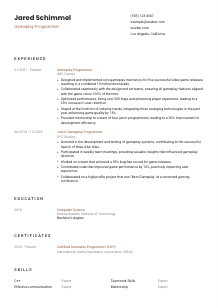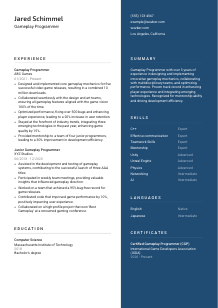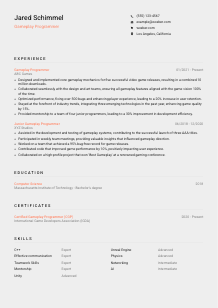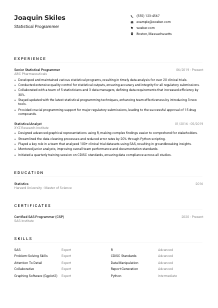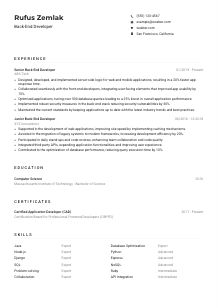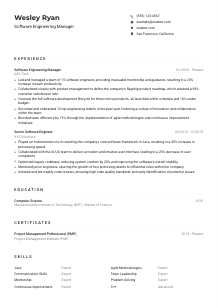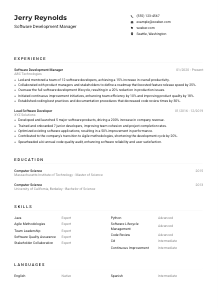Gameplay Programmer Resume Example
Crafting awesome gaming experiences, but your resume is stuck in sandbox mode? Level up with this Gameplay Programmer resume example, power-created using Wozber free resume builder. See how you can align your coding quests with job quests, making your game-dev career a constant adventure!
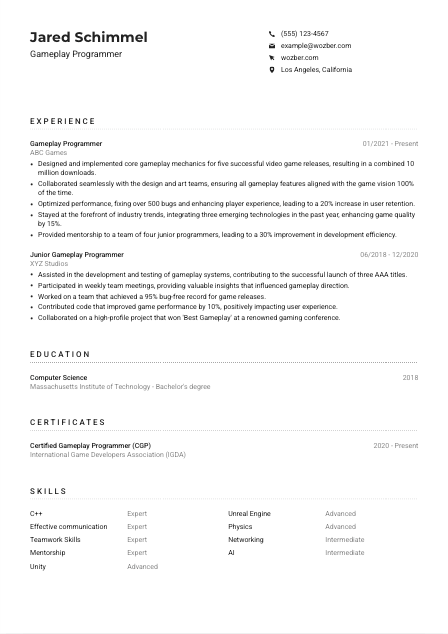
How to write a Gameplay Programmer Resume?
Hello, aspiring Gameplay Programmer! If you're eager to transform your love for gaming and programming into your dream job, a standout resume is your first level to beat. In the competitive realm of game development, your resume is not just a document; it's a level-up in your career quest.
With the help of the Wozber free resume builder, this in-depth guide will navigate you through crafting a resume that not just meets but exceeds the expectations tailored specifically for a Gameplay Programmer role. Get ready to embark on a journey to frame your resume as a compelling narrative that captures the essence of your technical prowess and creativity.
Personal Details
The 'Personal Details' section of your resume is your spawn point in the digital job arena. As a Gameplay Programmer, this is where you set your coordinates, ensuring the scouts (hiring managers) know where to find you. Let's tailor this section to teleport you straight into the heart of the game development battlefield, making sure you start on the right foot.
1. Brand Yourself
Think of your name as your unique tag in the vast multiplayer game of the job market. Use a clear, professional font letting your name stand tall like a developer's signature on a newly released title.
2. Match the In-Game Role
Under your name, specify your class - in this case, 'Gameplay Programmer'. This alignment places you right into the game dev guild you're aiming for, signaling to hiring managers that you're ready for this specific quest.
3. Establish Your Communication Channels
Your contact details are your server links. Make sure your phone number is the hotline to your quest hub and your email address is as professional as your coding style— firstname.lastname@example.com marks you as a true pro.
4. Set Your Home Base
"Must be located in or willing to relocate to Los Angeles, California." This part of the quest details is crucial. By stating "Los Angeles, California" prominently, you're checking off a major requirement point without them having to initiate a side quest to find out.
5. Optional Guild Links
If you've got a portfolio on GitHub or a LinkedIn profile showcasing your previous quests and achievements, include it. This can provide scouts a sneak peek into your coding adventures and team collaborations.
Takeaway
Thoughtfully crafted personal details set the stage for your resume, introducing you as the hero of your own storyline. Keep this section precise, ensuring every piece of information provided maps directly back to the quest at hand. Your resume's introduction is the first checkpoint on your journey to a gameplay programmer role, so make it count!





Experience
As a Gameplay Programmer, your experience section is your epic quest log, displaying the dragons you've slain (challenges you've overcome) and the realms you've explored (projects you've contributed to). To truly resonate with hiring managers, your quest log must be more than a list; it must be a testament to your journey's highlights, closely aligned with the needs of the role you're pursuing.
- Designed and implemented core gameplay mechanics for five successful video game releases, resulting in a combined 10 million downloads.
- Collaborated seamlessly with the design and art teams, ensuring all gameplay features aligned with the game vision 100% of the time.
- Optimized performance, fixing over 500 bugs and enhancing player experience, leading to a 20% increase in user retention.
- Stayed at the forefront of industry trends, integrating three emerging technologies in the past year, enhancing game quality by 15%.
- Provided mentorship to a team of four junior programmers, leading to a 30% improvement in development efficiency.
- Assisted in the development and testing of gameplay systems, contributing to the successful launch of three AAA titles.
- Participated in weekly team meetings, providing valuable insights that influenced gameplay direction.
- Worked on a team that achieved a 95% bug‑free record for game releases.
- Contributed code that improved game performance by 10%, positively impacting user experience.
- Collaborated on a high‑profile project that won 'Best Gameplay' at a renowned gaming conference.
1. Align Your Quests
First, break down the job description to understand the core mechanics and realms the role entails. Have you designed gameplay mechanics? Worked with Unity or Unreal Engine? Show how your past quests align with these requirements.
2. Present Your Programming Saga
Structure your experiences in reverse-chronological order. Your latest epic should come first, showcasing your current level and expertise. For each position, share the realm (company), your role in the quest (job title), and the time span of your adventures.
3. Highlight Your Achievements
Instead of merely listing duties, focus on your achievements. Did you optimize performance leading to smoother gameplay? How many bugs did you slay? Quantify your impact to provide tangible proof of your prowess.
4. Power-Ups Through Numbers
Quantifying your achievements adds weight to your claims. "Optimized performance, fixing over 500 bugs and enhancing player experience" gives a clear measurable impact of your work, akin to showcasing your high score.
5. Equip Only Relevant Gear
Your experience section should only contain weapons and armor relevant to your Gameplay Programmer role. If a position doesn't directly contribute to your strength in this field, consider leaving it out for brevity and focus.
Takeaway
A well-documented quest log not only showcases your journey but also highlights your readiness for the next big challenge. As you tailor your experience section, ensure each line convinces the hiring manager that you're not just a participant in this game but a potential gameplay programmer legend. Remember, it's the quality of the quests and the impact they had on the realm that matter most.
Education
In the ever-evolving landscape of game development, your educational background is the foundation upon which your coding skills are built. This section is your opportunity to show that you possess the theoretical knowledge and formal training necessary to understand and innovate within the industry.
1. Highlight Your Hero's Academy
The job specifies a "Bachelor's degree in Computer Science, Engineering, or related field." If your alma mater awarded you a degree that fits, make it the star of your education section, aligning your credentials with the job's prerequisites.
2. Layout the Lore
Keep the structure of this section clear and straightforward. State the field of study, degree obtained, the institution's name, and your graduation date. This layout helps hiring managers quickly verify your educational qualifications.
3. Tailor Your Training
Since the role demands specific technical skills and knowledge, highlight any part of your education that directly relates to game development, such as coursework in C++ or experience with Unity and Unreal Engine.
4. Showcase Your Side Quests
If you've completed relevant projects, capstones, or were part of clubs or organizations that add depth to your profile as a Gameplay Programmer, list them here. This adds texture to your character, showing you're engaged and proactive in your field.
5. Continuous Leveling
While not every role will demand post-graduate achievements, indicating any ongoing education or related courses can demonstrate your commitment to staying current in a fast-paced industry.
Takeaway
Your education section is a testament to your foundational knowledge and readiness to tackle the technical challenges of game programming. By aligning it with the role's requirements and showcasing relevant achievements, you assure hiring managers you're not just equipped with theory but also primed for practical challenges.
Certificates
In the realm of game development, certificates serve as badges of honor, highlighting specialized training and achievements beyond your formal education. While not explicitly mentioned in the quest details (job description), well-chosen certificates can significantly bolster your credibility.
1. Select Your Achievements
Focus on certificates that are most relevant to the Gameplay Programmer role. This could be proficiency in C++, Unity or Unreal Engine, AI development, or physics simulation. Quality over quantity ensures your badge display doesn't overwhelm but impresses.
2. Date Your Quests
If your certificates have an expiration or achievement date, including this information helps hiring managers assess the recency of your training and knowledge. It shows you're committed to keeping your skills sharp and up to date.
3. Embark on New Quests
The tech landscape is ever-evolving, with new tools and techniques constantly emerging. Stay proactive by seeking out new learning opportunities to ensure your badge collection stays relevant and your skillset comprehensive.
Takeaway
By carefully selecting and presenting your certificates, you provide tangible evidence of your commitment to excellence and continual growth. These badges of honor, when aligned with the role's requirements, can set you apart as a candidate truly dedicated to their craft.
Skills
The Skills section of your resume is where you get to showcase your programming spells and collaboration buffs. It's a condensed view of your professional toolkit, highlighting the abilities that make you an exceptional candidate for the Gameplay Programmer role.
1. Decode the Spellbook
Start by examining the job description for explicit and implicit skills. "Proficiency in C++" and "experience with game engines such as Unity or Unreal Engine" are your required spells. Make sure they're prominently featured in your skills section.
2. Equip Your Best Spells
Prioritize listing skills that directly match those mentioned in the job description. For a Gameplay Programmer, hard skills like coding languages and soft skills like "Effective communication" and "Teamwork skills" are crucial. This focused approach ensures you don't clutter your skill bar with less relevant abilities.
3. Organize Your Skillset
Keep your skills section neatly organized, grouping similar skills together to make it easy for hiring managers to scan. A clean, well-structured skillset tells the story of a logical and methodical mind, traits highly valued in a Gameplay Programmer.
Takeaway
By curating a list of skills that aligns with the job's requirements, you signal to hiring managers that you're not just capable but a perfect fit for the role. It's not just about having the skills but presenting them in a way that clearly communicates your value and readiness to take on the gameplay programming challenges ahead.
Languages
In the diverse world of game development, communication is key, not just with your immediate team but potentially with a global community. Your language skills can greatly enhance your resume, spotlighting you as a Gameplay Programmer with the versatility to bridge worlds.
1. Essential Communication Channels
For the Gameplay Programmer role, fluency in English is a must. Highlighting your proficiency in English at the native or fluent level ensures that you meet the basic communication requirement, essential for teamwork and collaboration.
2. Additional Languages
While not a direct requirement, the ability to speak additional languages can be a bonus, particularly in studios that collaborate internationally. Listing additional languages at lower proficiency levels can demonstrate your broad communication skills and cultural adaptability.
3. Accurate Proficiency Labels
Be honest and precise about your language proficiency levels. Using terms like "Native", "Fluent", "Intermediate", and "Basic" provides a clear understanding of your capabilities, setting realistic expectations for your role in a global or local team.
Takeaway
While the primary focus for a Gameplay Programmer is technical skill, your ability to communicate in multiple languages can cast you as a versatile and adaptable team player. This section is your chance to show you're not just a coder but a communicator, ready to connect and collaborate in a diverse development landscape.
Summary
Your resume's summary is akin to the opening cinematic of your favorite game, setting the stage and gripping your audience from the get-go. This is your chance to encapsulate your career narrative, highlighting your journey, skills, and readiness for the Gameplay Programmer role.
1. Set the Scene
Kick off with a powerful opening statement that encapsulates your professional identity. Mention your years of experience and your specialty. 'Gameplay Programmer with over 5 years of experience in designing and implementing innovative gameplay mechanics...' instantly reveals your level and area of expertise.
2. Highlight Key Quests
Briefly mention your most impressive achievements and skills that directly address the job requirements. Referencing your success stories, like 'resulting in a combined 10 million downloads,' offers a snapshot of the impact you've made in your field.
3. Concise Yet Compelling
Keep your summary sharp and to the point. Within 3-5 lines, you should be able to convey your professional essence and why you're the chosen one for the role. Think of it as your pitch to the hiring manager to explore the rest of your resume.
Takeaway
A well-crafted summary can make a memorable introduction, enticing hiring managers to dive deeper into your application. It's your chance to make a strong first impression, showcasing your unique value proposition and setting the tone for your detailed qualifications that follow. Consider it your game's opening cinematic - make it count!
Unlocking Your Next Level in Game Development
With each section of your resume finely honed, you're now equipped to embark on the quest of landing your dream job as a Gameplay Programmer. Remember, crafting a resume is much like developing a game itself - it requires attention to detail, creativity, and an understanding of the audience (in this case, the hiring manager). Using the Wozber free resume builder, including its ATS-compliant resume format and ATS-friendly resume template, ensures you're well-prepared for the recruitment process. Wozber's ATS resume scanner is the ultimate tool in your toolkit for ATS optimization, making sure your resume not only gets seen but also makes a lasting impression.
Now, go forth and conquer the job market, one application at a time. Your epic career in game development awaits!

- Bachelor's degree in Computer Science, Engineering, or related field.
- Minimum of 3 years' professional experience in game development or a related field.
- Proficiency in C++ and experience with game engines such as Unity or Unreal Engine.
- Strong understanding of gameplay systems, AI, physics, and networking.
- Effective communication and teamwork skills, with the ability to collaborate with multidisciplinary teams.
- Must have the ability to converse fluently in English.
- Must be located in or willing to relocate to Los Angeles, California.
- Design and implement core gameplay mechanics for video games.
- Collaborate with design and art teams to ensure gameplay features align with the overall game vision.
- Optimize performance, fix bugs, and improve the player experience.
- Stay up to date with industry trends and emerging technologies to continually enhance game quality.
- Provide mentorship and guidance to less experienced programmers as needed.





